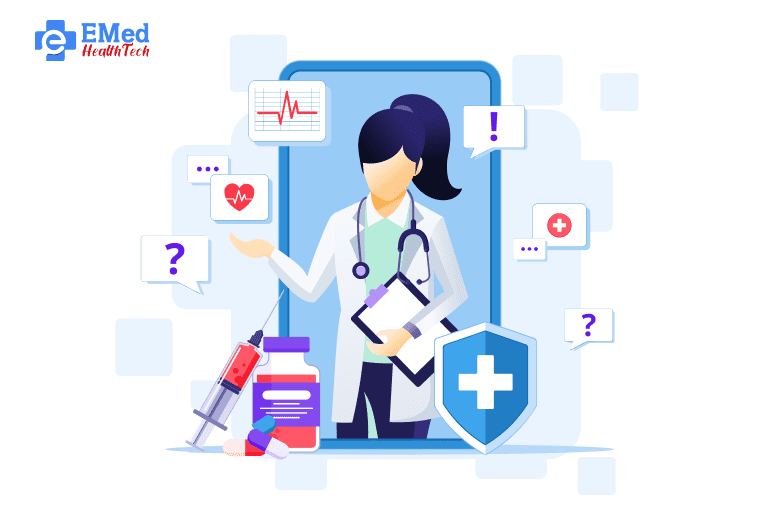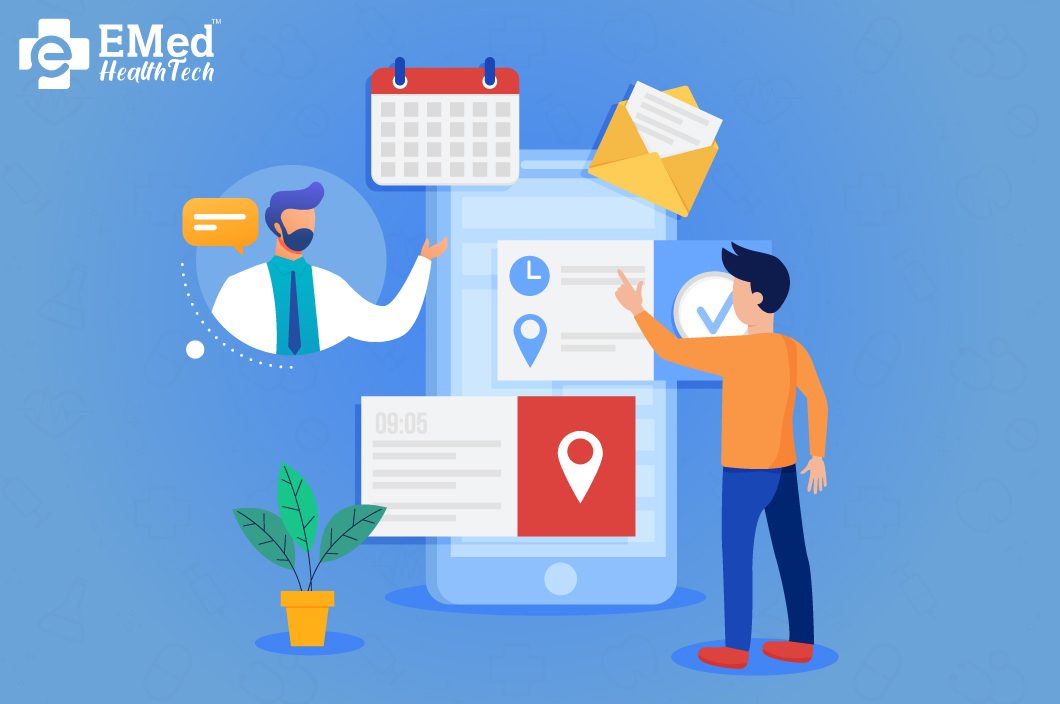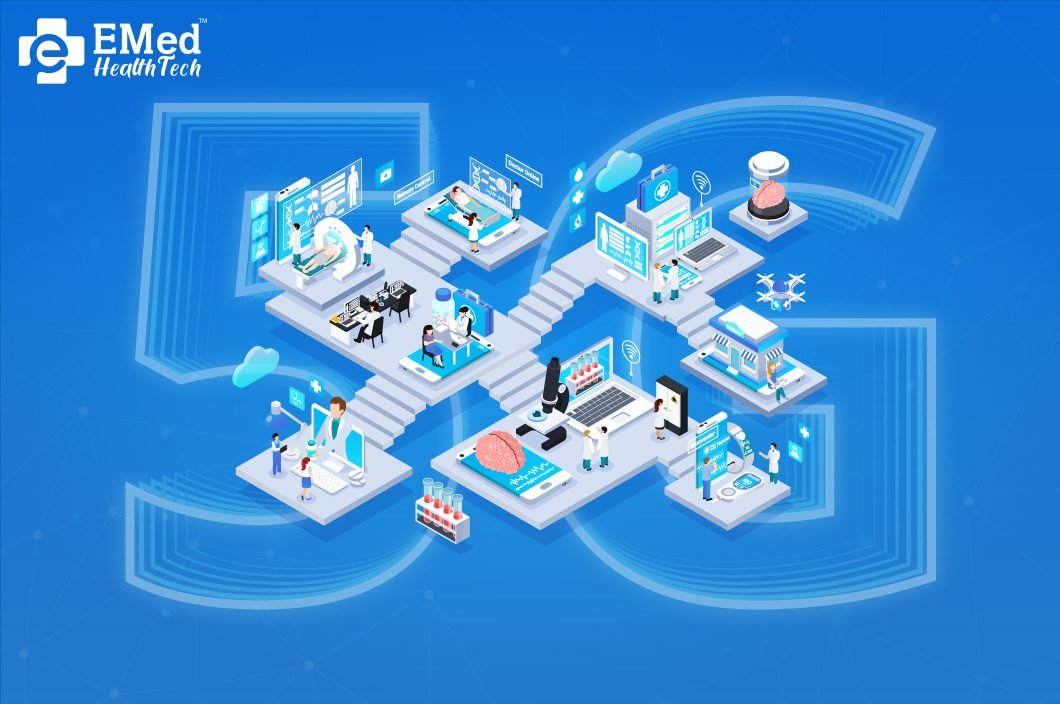The COVID pandemic was our first brush with being forced to stay indoors due to health hazards. As a response, the health tech industry pushed solutions like mHealth and online consultations to the forefront to improve people’s access to safe and effective medical care. And the result has been eye-opening in how investment in digital health and virtual healthcare business models has skyrocketed.
In this post-pandemic period, we see healthcare practitioners implementing virtual healthcare services, like mobile health apps for booking doctors’ appointments. Healthcare facilities have recognized the upward trend and are developing their apps like doctors’ appointment booking apps, hospital management apps, pharmacy apps, etc.
This article delves into how a doctor appointment booking app can be developed and what you need to keep in mind. We also share tips and tricks from our experts for developing your doctor’s appointment app.
Digital Healthcare Market & Trends
The pandemic saw a sharp spike in the utilization of telehealth services. It was reported to be 38 times higher than pre-pandemic times. The spike to 32% has stabilized at 13-17% across all specialties.
A significant factor driving the trend has been the increased confidence of patients in digital healthcare. According to McKinsey, nearly 40% of consumers in their survey said they “believe they will continue to use telehealth going forward—up from 11 percent of consumers using telehealth before COVID-19.”
The better prospects in digital health have also increased investment in digital health. Innovation picked up speed with venture capitalist digital health investment in June 2020 tripled by June 2021, according to rockehealth.com.
Studies show that the global market for such healthcare apps is growing, with an estimated market value of USD 189 billion by 2025. Another study shows that 90% of physicians use smartphones for schedule management, EHR access, communication with the team, or reference information. From the patient’s perspective, there is high engagement with mobile health technology. A study by Boston Tech Corporation showed that 74% of patients use wearables and other mHealth tools to help them manage and cope with their health conditions. The recently presented Union Budget 2022-2023 strongly indicates that Telemedicine is a Must for Digital Health.
All studies and trends show positive growth for electronic health apps like those for booking doctor appointments. It also has many benefits that make patients want to have it. Let us take a quick look at the benefits of a doctor appointment booking app.
Challenges Faced Within the Industry
The healthcare industry faces certain challenges that stand in the way of providing proper healthcare. Doctors and healthcare providers are sometimes helpless due to barriers preventing patients from receiving timely attention and treatment. Here is a quick look at them.

1. Face-to-face meetings
Not every doctor’s consultation has to be faced with this. Certain illnesses and follow-up meetings could be done over the phone or virtually. With no such provision, the number of patients blocks up an entire day’s worth of appointments.
2. Time restraint
Doctors find it difficult to manage time if they have to attend to patients and clinics at different places. A lot of time is wasted traveling.
3. Access
Healthcare providers may find themselves wanted in places they may not have easy access. This may prevent timely healthcare from being provided.
4. Better appointment management
The lack of a proper system can make the consulting process tedious. Doctors’ offices are clogged with a lack of appointment booking systems.
Challenges Associated with Traditional Methods of Taking Doctor Appointments
The traditional mode of consulting a doctor is a long procedure. And we can all agree that many challenges in it make us begrudge the system. A doctor’s appointment app directly addresses these issues. Let us look at some of the challenges within the traditional method of taking appointments.

- Long waiting periods: Say you are suffering from chronic joint pain. Only one ortho specialist in your nearby hospital is available for consultation only on certain days. These days will naturally have a lot of traffic too. Getting an appointment, braving the long queue, and finally seeing the doctor can be strenuous.
- Travel expenses: It is difficult to find doctors specializing in certain niches. You might have to travel long distances to get a consultation, which can be expensive, depending on the distance you have to cover.
- Skipped Appointments: There are several reasons one might skip an appointment with a doctor. Some patients may forget or skip appointments due to poor health or expenses.
- Safety from infectious pathogens: This is perhaps why telehealth solutions gained popularity during the pandemic. The need to be in a room full of ill people increases the chances of catching it.
Consult from home for chronically ill: Patients who are not well enough to travel can find it even more challenging to make it to appointments. Without virtual consulting, they might choose to skip appointments.
A doctor appointment booking app has a lot of advantages, making it highly sought after by medical professionals for their clinics and healthcare facilities. Patients use it to get the best medical services, and there are plenty of options in the market. Healthcare facilities are competing to be the best on the scene.
Both healthcare providers and patients can benefit from a doctor consultation app.
Benefits to the hospital/clinic/healthcare provider include:
- Manage appointments via online channels.
- Avoid overbooking by accurately calculating and managing time slots.
- Lessen skipped appointments as the hassles and expenses of physical travel are some of the primary reasons patients skip.
- Streamline processes of the clinic/hospital, and increase efficiency.
- Automate administrative tasks and free up more time for staff for productive work.
- eHealthcare reports to analyze performance and make relevant adjustments to make improvements.
- Reduce chances of errors that may occur due to human causes.
Benefits to the patients include:
- Patient’s can book an appointment anytime from the comfort of their home.
- They can use the services of the app 24/7.
- Pay medical bills, and access medical records from a single app.
- Communicate with the healthcare providers in real time.
Three Tips for Successful Implementation of Doctors Appointment app
Now that you know the advantages of the doctor appointment app development, you may not have any doubt as to whether or not you need the app. As much as the app is helpful, it takes a careful approach to make it truly work. Many different apps launch and then fizzle out due to small mistakes or because they overlooked one or the other thing.
Here are some tips you can keep in mind, so you do not have to make the same mistakes as others.
Take Wearables into Account
Wearables have an immense market. People from all age groups increasingly use them. It is also easily accessible and affordable. The amount of data a wearable health tech generates is immense. It is also a great way to monitor patients who are under chronic illnesses.
Compliance and Regulations
This is perhaps the trickiest part of a doctor’s appointment app. Since it is relatively new, few users know the privacy policies, how the information is used, and more. Regulatory bodies also keep a tight leash on companies for collecting, storing, and processing patient data. These regulations change over time and may prove hard to keep up. You must make sure your app is compliant and follows all regulations.
Managing Doctors Listing
The doctor’s appointment app will require a doctor’s listing. You can manage the doctor listing on your own via an admin panel. Or you can use a second app for doctors where they can edit details on their own and manage their appointments.
When doctors have an app, they can manage it themselves, taking a load off your head. Patients can also get accurate data directly from doctors.
Development Tips: Features You’ll Find in a Great Doctor’s Appointment App
A well-developed on-demand doctor app is marked by the features it has. Here are some features you need to include in a doctor’s appointment app.
- Customization: Each healthcare facility has its own needs. A good app is marked by its ability to be customized to the client’s needs.
- Video consultation: A doctor appointment app has the primary facility to conduct a virtual consultation, which will significantly organize a doctor’s office.
- Multi-Language patient app: Considering the patients and doctors of various ethnicities using the app, the app should support English and other regional languages.
- Separate Mobile App for Patients and Doctors: Ideally, a doctor’s appointment app will have separate apps, one for the patient to make appointments, make virtual consolation, etc. The doctor’s app will have provisions to schedule visits, access EHR, organize consultations, etc.
- Own payment gateway: The app should provide the convenience of a payment gateway so that patients can make secure payments.
- Professional Profile: Doctors should be able to maintain a professional profile, which the patients can look up before choosing to consult them.
- Patient History and Electronic Medical Records: The app should integrate the patient history and previous medical records so that doctors and patients can easily access and manage them.
- Appointment Management: The star feature of an appointment management app is this feature. It enables patients to easily make appointments with the doctor they need according to their availability, and doctors can manage appointments and schedule their work around it.
- Digital Medicine order: Doctors can make digital medicine orders within the app so that the patient gets it on their profile. There is no mix-up or confusion, they simply have to show it to the pharmacy.
- Home Delivery of Medicines Based on Medicine order: Patients can also order medicines online, which will be delivered to their homes if they use the online pharmacy module.
- Peer-to-peer support: Patients can find support groups and communities to discuss their treatment journey. The feature to make communities makes the patients connect to the app intimately.
- 3rd Party software integrations: The app should be enabled with 3rd party software integration to enable different services. Accessing EHR, maps, calendars, etc., requires provisions to integrate.
Plan Your Budget: What Is The Cost To Make A Doctor’s Appointment App?
A doctor appointment app might cost between $40,000 and $50,000 to develop on average. The price range for adding sophisticated features like artificial intelligence is between $100,000 and $150,000.
Additional factors like the features and functionalities, app categories, UI and design, and development time also vary the cost of developing an app. The company you choose to develop your app also decides how much you will have to spend on the app.
Instead of spending money on developing a highly advanced full-fledged doctor appointment booking app, we advise starting with an MVP to gauge market acceptance before expanding to include other healthcare app features. By doing this, you could avoid giving users everything upfront and having the same medical app features for all time, ensuring that you are constantly adding value to their lives.
There are several ways in which you can make your doctor app or Telemedicine app development process easier. Since other products are already on the market, you can thoroughly research and find the shortcuts and tricks to improve your app.
There are several APIs that are extremely useful. You can use them to make your app much more polished and feature-rich. Here is a quick look at some of them.
- Manage and maintain booking via 10to8’s API. It is a great tool that saves you a lot of time developing from scratch.
- Symptom Checker API has a repository of symptoms by which the patients can be allocated to the doctor most apt to treat those symptoms.
- BetterDoctor API shows data about doctors, helping you find the best doctor for your needs.
- SimplyBook.me API can be used to schedule appointments with the doctor of your choice.
- Doctoralia API has a detailed listing of doctors with reviews from other patients so that patients can make better bookings.
- Payment portals like Stripe and Braintree SDKs are a necessity for managing payments.
- Third-party integrations to make your app packed with features like Twilio for video calling, Tawk.to for chatting, etc. Payment integration for national and international payments like Paytm, PayPal, and Razorpay.
The Perfect Monetisation Strategy for your App
There are many ways to monetize an app and create a paying customer out of your users. Some of these strategies offer the user to experience your services, evaluate them, and then buy a paid service. Others utilize traditional methods of monetization, like advertisements. Let us look into it.
- Freemium: This strategy utilizes two versions of the same app. A free version of the app has limited functionalities, while the premium version requires you to pay an amount to unlock all the services. Your users will likely shift to premium to enjoy the advanced functions.
- Commission-based model: This model is where you provide a platform for the doctors and patients to interact to make appointments. You can get a fee from the doctors to display their availability.
- Local Ads: Healthcare brands often show interest in placing advertisements in your apps. Keeping the relevant ads adds value to your customer’s experience.
- Paid Listing: This is another way to earn revenue from doctors. In this way, you offer the doctors more visibility and patients by placing them higher on the list of doctors for a fee.
- In-app purchases: This offers the patients to buy services through your app. The app is free, but you earn a commission when the patient pays for medicines, services, and visits through your app.
Building the App with Experts
A doctor consultation app is a great way to improve the patient inflow for hospitals and clinics. Its features and advantages give apps an upper hand over traditional methods. Ultimately it comes down to the quality of your app and how well it is built. A doctor appointment booking app development can be the most crucial step in your journey.
You should hire experts like EMed HealthTech for your app development. EMed HealthTech offers custom healthcare software development services at affordable prices. We use emerging technologies to make sure you get only the best. Our software is richly featured with a robust UI. We also have a healthcare-integrated platform for pharmacy, telemedicine, and lab. Reach out to us today to get an estimate. Our experts are happy to help you.














